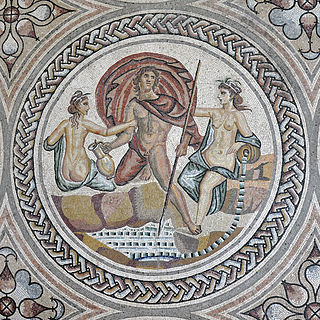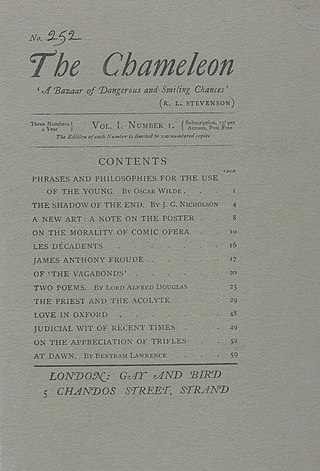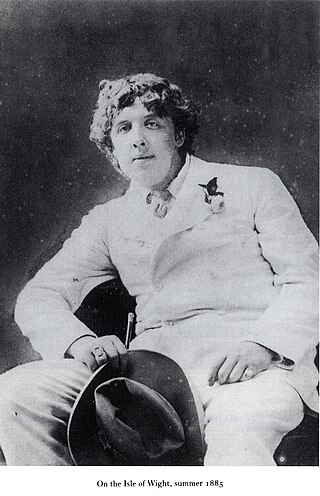See also
- The Love That Dares to Speak Its Name, a 1976 poem by James Kirkup
The love that dare not speak its name is a phrase from the last line of the poem "Two Loves" by Lord Alfred Douglas, written in September 1892 and published in the Oxford magazine The Chameleon in December 1894. It was mentioned at Oscar Wilde's gross indecency trial and is usually interpreted as a euphemism for homosexuality. [1]
In Wilde's definition, "the love that dare not speak its name" was:
[S]uch a great affection of an elder for a younger man [...] such as Plato made the very basis of his philosophy [...] It is that deep, spiritual affection that is as pure as it is perfect [...] There is nothing unnatural about it. It is intellectual, and it repeatedly exists between an elder and a younger man, when the elder man has intellect, and the younger man has all the joy, hope and glamour of life before him. [2] [3]

In Greek mythology, Narcissus was a hunter from Thespiae in Boeotia who was known for his beauty which was noticed by all, regardless of gender. According to the best known version of the story, by Ovid, Narcissus rejected all advances, eventually falling in love with a reflection in a pool of water, tragically not realizing its similarity, entranced by it. In some versions, he beat his breast purple in agony at being kept apart from this reflected love, and in his place sprouted a flower bearing his name.

Oscar Fingal O'Fflahertie Wills Wilde was an Irish poet and playwright. After writing in different forms throughout the 1880s, he became one of the most popular playwrights in London in the early 1890s. He is best remembered for his epigrams and plays, his novel The Picture of Dorian Gray, and his criminal conviction for gross indecency for homosexual acts.

Lord Alfred Bruce Douglas, also known as Bosie Douglas, was an English poet and journalist, and a lover of Oscar Wilde. At Oxford he edited an undergraduate journal, The Spirit Lamp, that carried a homoerotic subtext, and met Wilde, starting a close but stormy relationship. Douglas's father, the Marquess of Queensberry, abhorred it and set out to humiliate Wilde, publicly accusing him of homosexuality. Wilde sued him for criminal libel, but some intimate notes were found and Wilde was later imprisoned. On his release, he briefly lived with Douglas in Naples, but they had separated by the time Wilde died in 1900. Douglas married a poet, Olive Custance, in 1902 and had a son, Raymond.

In classical mythology, Hylas was a youth who served Heracles as companion and servant. His abduction by water nymphs was a theme of ancient art, and has been an enduring subject for Western art in the classical tradition.

Jane Francesca Agnes, Lady Wilde was an Anglo-Irish poet under the pen name Speranza and supporter of the nationalist movement. Lady Wilde had a special interest in Irish folktales, which she helped to gather and was the mother of Oscar Wilde and Willie Wilde.

The Ballad of Reading Gaol is a poem by Oscar Wilde, written in exile in Berneval-le-Grand and Naples, after his release from Reading Gaol on 19 May 1897. Wilde had been incarcerated in Reading after being convicted of gross indecency with other men in 1895 and sentenced to two years' hard labour in prison.

David and Jonathan were, according to the Hebrew Bible's Books of Samuel, heroic figures of the Kingdom of Israel, who formed a covenant, taking a mutual oath.

Vyvyan Beresford Holland, was an English author and translator. He was the second-born son of Irish playwright Oscar Wilde and Constance Lloyd, and had a brother, Cyril.

Ada Esther Leverson was a British writer who is known for her friendship with Oscar Wilde and for her work as a witty novelist of the fin-de-siècle.

Constance Mary Wilde was an Irish writer. She was the wife of Irish playwright Oscar Wilde and the mother of their two sons, Cyril and Vyvyan.
"Call a spade a spade" is a figurative expression. It refers to calling something "as it is"—that is, by its right or proper name, without "beating about the bush", but rather speaking truthfully, frankly, and directly about a topic, even to the point of bluntness or rudeness, and even if the subject is considered coarse, impolite, or unpleasant.

The Illustrated Sporting and Dramatic News was a British weekly magazine founded in 1874 and published in London. In 1945 it changed its name to the Sport and Country, and in 1957 to the Farm and Country, before closing in 1970.

This is a bibliography of works by Oscar Wilde (1854–1900), a late-Victorian Irish writer. Chiefly remembered today as a playwright, especially for The Importance of Being Earnest, and as the author of The Picture of Dorian Gray; Wilde's oeuvre includes criticism, poetry, children's fiction, and a large selection of reviews, lectures and journalism. His private correspondence has also been published.

De Profundis is a letter written by Oscar Wilde during his imprisonment in Reading Gaol, to "Bosie".

Poems in Prose is the collective title of six prose poems published by Oscar Wilde in The Fortnightly Review. Derived from Wilde's many oral tales, these prose poems are the only six that were published by Wilde in his lifetime, and they include : "The Artist", "The Doer of Good", "The Disciple", "The Master", "The House of Judgment" and "The Teacher of Wisdom". Two of these prose poems, "The House of Judgment" and "The Disciple", had appeared earlier in The Spirit Lamp, an Oxford undergraduate magazine, on 17 February and 6 June 1893 respectively. A set of illustrations for the prose poems was completed by Wilde's friend and frequent illustrator, Charles Ricketts, who never published the pen-and-ink drawings in his lifetime. The set of prose poems was released in a privately printed chapbook in 1905.

Oscar is an American opera in two acts, with music by composer Theodore Morrison and a libretto by Morrison and English opera director John Cox. The opera, Morrison's first, is based on the life of Oscar Wilde, focused on his trial and imprisonment in Reading Gaol. It was a co-commission and co-production between Santa Fe Opera and Opera Philadelphia. This work received its world premiere at the Santa Fe Opera on 27 July 2013. Opera Philadelphia first presented the revised version of the opera on 6 February 2015.

The Sphinx is a 174-line poem by Oscar Wilde, written from the point of view of a young man who questions the Sphinx in lurid detail on the history of her sexual adventures, before finally renouncing her attractions and turning to his crucifix. It was written over a period of twenty years, stretching from Wilde's years as an Oxford student up to the poem's publication in an édition de luxe in 1894. The Sphinx drew on a wide range of sources, both ancient and modern, but particularly on various works of the French Decadent movement. Though at first coldly received by critics it is now generally recognized as Wilde's finest Decadent poem, and has been described as "unrivalled: a quintessential piece of fin-de-siècle art".

Charmides was Oscar Wilde's longest and one of his most controversial poems. It was first published in his 1881 collection Poems. The story is original to Wilde, though it takes some hints from Lucian of Samosata and other ancient writers; it tells a tale of transgressive sexual passion in a mythological setting in ancient Greece. Contemporary reviewers almost unanimously condemned it, but modern assessments vary widely. It has been called "an engaging piece of doggerel", a "comic masterpiece whose shock-value is comparable to that of Manet's Olympia and Le Déjeuner sur l'herbe", and "a Decadent poem par excellence" in which "[t]he illogicality of the plot and its deus-ex-machina resolution render the poem purely decorative". It is arguably the work in which Wilde first found his own poetic voice.

The Chameleon was a literary magazine edited by Oxford undergraduate John Francis Bloxam. Its first and only issue was published in December 1894. It featured several literary works from the Uranian tradition, concerning the love of adolescent boys.

"The Harlot's House" (1885) is a 36-line poem in terza rima by Oscar Wilde. It touches on the issue of prostitution in a style which can be seen as either Aesthetic or Decadent. It is considered one of Wilde's finest poems, and has been set to music several times.